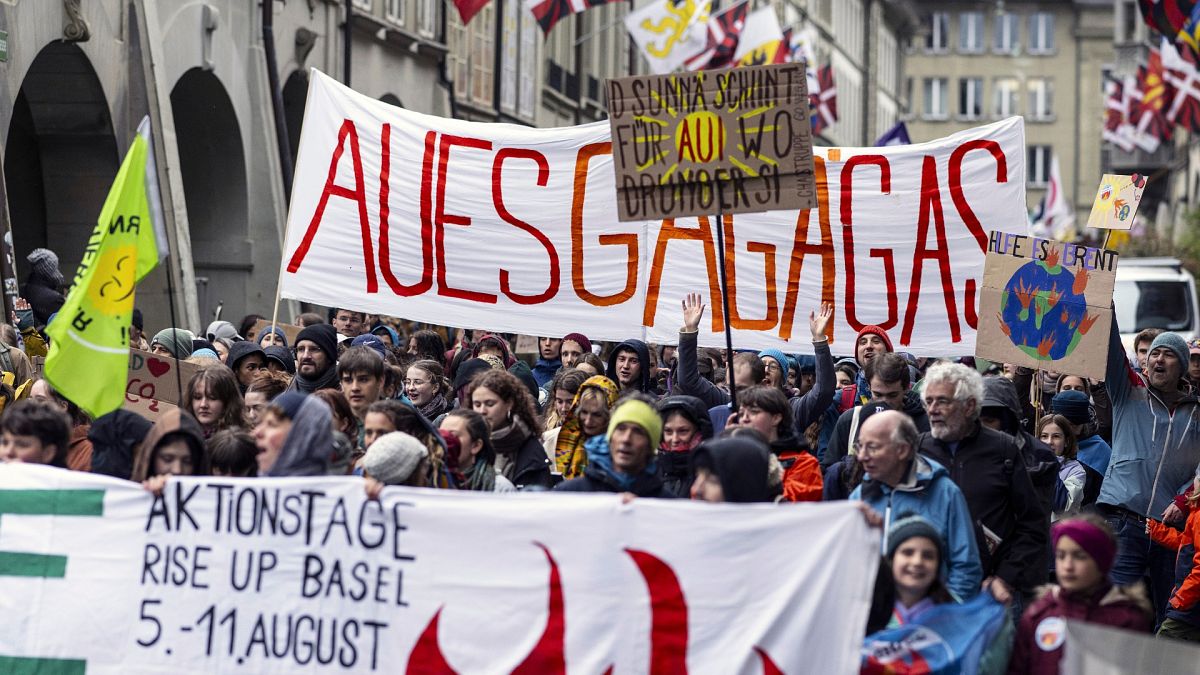Could Switzerland follow the US out of the Paris Agreement?

Switzerland’s biggest political party claims that a recent referendum indicates voters don’t want radical climate targets.
Just hours after he took office, President Donald Trump signed an executive order to withdraw the US from the Paris Agreement.
The process will take a year to complete but the decision to leave has emboldened other political leaders to put forward the possibility of an exit.
Following a vote which overwhelmingly rejected an environmental responsibility initiative, Switzerland’s biggest political party has called for the country to follow the US.
Dubbing the accords a collection of “utopian climate targets” the Swiss People’s Party wants the country to exit the Paris Agreement. But how realistic is this demand and what would it mean for Switzerland’s future climate obligations?
Swiss People’s Party calls for Paris Agreement exit
On 9 February, a referendum saw Swiss voters reject an “environmental responsibility initiative” – more than 60 per cent voted no.
The right-wing Swiss People’s Party celebrated the result, claiming that the initiative wanted to “catapult Switzerland back into the Stone Age”. In a press release, they said restrictions on housing, heating, food and clothing would have all been on the agenda.
“Driving would have been made impossible. Prices would have skyrocketed, jobs and training would have been destroyed. Poverty would have become the norm,” it adds.
The Swiss People’s Party also used the statement to demand that Switzerland withdraw from the Paris Agreement. “Utopian climate targets only lead to new bans and billions of francs in additional costs for the Swiss population,” they said.
In an interview with Swiss public television RTS, party leader Marcel Dettling claimed that the government “ratified this agreement without asking parliament or the Swiss people.”
“The government can independently decide to withdraw from this agreement,” he added.
Could Switzerland leave the Paris Agreement that easily?
Switzerland’s Federal Council ratified the Paris Agreement in 2017 after it was approved by parliament earlier that year.
It was then subject to something known as an optional or facultative referendum. This gives Swiss citizens the opportunity to challenge the decision over a 100-day period. Because no such challenge was launched, it is then assumed that it has been implicitly approved by the Swiss people.
Regardless of Dettling’s comments, an initiative to withdraw Switzerland from the Paris Agreement would have to be approved by parliament through a federal decree. This would also mean it would be subject to a referendum and, therefore, the approval of the Swiss public.
“Leaving the Paris Agreement would not absolve Switzerland of its legal obligations to pursue science-based climate action – it would merely strip the country of its influence in shaping future global climate decisions,” adds Sébastien Duyck, senior attorney and Human Rights & Climate Campaign manager for the Centre for International Environmental Law.
“Diplomatically, it would be the equivalent of scoring an own goal.”
Do Swiss voters want a Paris Agreement exit?
Switzerland’s second largest party, the Social Democratic Party of Switzerland, said following the vote that the initiative was simply “the wrong solution to current climate policy challenges”.
But, the party added, the most recent votes show that the need for climate action is still a priority for the population.
It is a sentiment shared by Environment Minister Albert Rösti, who, despite being a member of the Swiss People’s Party, has rejected the party’s demands.
At a press conference following the result of the referendum, he told reporters that this ‘no’ was ”certainly not a ‘no’ to protecting the environment”.
Rösti also pointed out that in June 2023, 60 per cent of voters approved a new climate law that seeks to speed up Switzerland’s shift to renewable energy and reach net zero by 2050.
He told Swiss news site Nau.ch that he still supports the Paris Agreement despite his party’s criticisms.
“The population has clearly passed the Climate and Innovation Act 2023. The population has thus committed itself to the Paris climate goals,” Rösti said.
“While some Swiss populists have voiced support for following Donald Trump’s decision to exit the Paris Agreement, the majority of the Swiss public remains firmly in favour of climate action, as reaffirmed in the 2023 referendum,” says Duyck.
“Switzerland’s government has also just submitted its latest commitment under the agreement.”
This national climate plan, known as a Nationally Determined Contribution, commits the country to reducing its greenhouse gas emissions by at least 65 per cent by 2035. It was one of just 15 countries to submit its updated NDC by the 10 February deadline.
What other countries want to leave the Paris Agreement?
So far the US is the only country to have initiated the process of leaving the Paris Agreement. But outside of Europe, other world leaders have also floated the idea of pulling their countries out.
Argentine President Javier Millei has been entertaining the idea since Trump won the US election last year. He was the first head of state Trump saw at Mar-a-Lago in Florida after his victory and has previously described international climate efforts as a “socialist lie”.
Indonesia, too, has been questioning a Paris Agreement exit since Trump’s victory.
“If the USA does not want to comply with the international agreement, why should a country like Indonesia comply with it?” Climate Commissioner Hashim Djojohadikusumo asked at a sustainability forum in early February.
Djojohadikusumo highlighted the disparity in carbon emissions per person between the two countries – the US emits around 13 tonnes of carbon per person annually, while the average Indonesian emits just 3 tonnes.
The commissioner added that it was not “justice” for Indonesia to be asked to close its coal power plants with one of the world’s largest emitters out of the accords.
World News || Latest News || U.S. News
Source link



